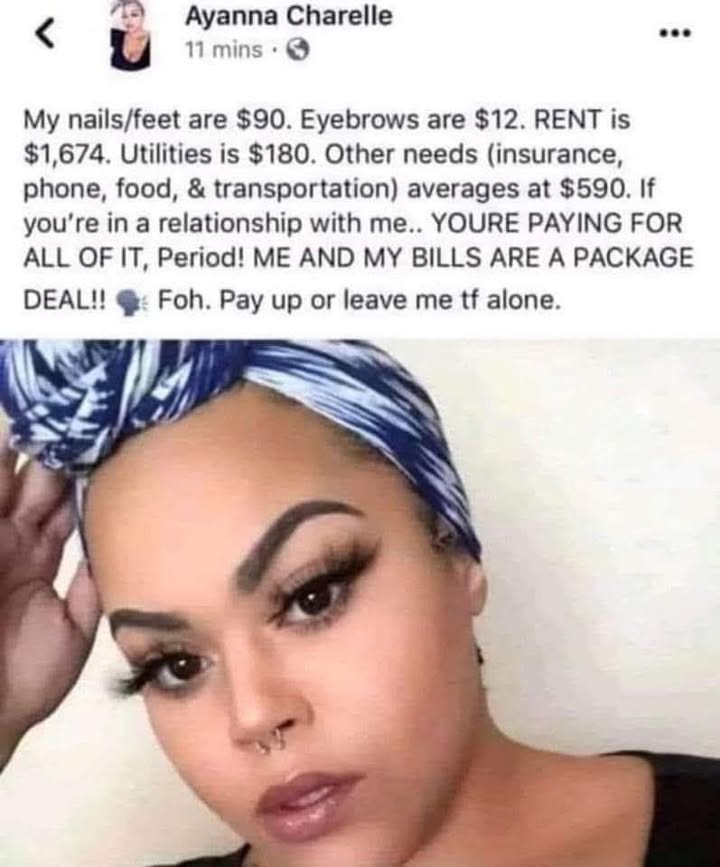Breaking Down the Controversial Debate: Should Finances Be Shared in Dating or Kept Separate Until Marriage?
“If you’re in a relationship with me… YOU’RE PAYING FOR ALL OF IT.” That’s the line that set the internet on fire. Ayanna Charelle’s now-viral post laid out the costs: $90 for nails and feet, $12 for eyebrows, $1,674 for rent, $180 for utilities, and $590 for insurance, phone, food, and transportation. Her message? “Me and my bills are a package deal!”

The question everyone’s asking: Should love come with a price tag?
The Post That Sparked a Debate
The total monthly cost Ayanna expects a partner to cover comes to $2,546. That’s right—over two and a half grand. For many, this sparked heated discussions about relationship expectations, financial responsibility, and the real meaning of partnership in modern dating.
Her unapologetic stance is dividing opinions. Some applaud her honesty, viewing it as a declaration of self-worth. Others label it entitlement, questioning the fairness of such expectations in non-marital relationships. The phrase “Pay up or leave me tf alone” became a rallying cry and a point of contention across social media platforms.
What the Internet is Saying
Twitter, TikTok, and Reddit lit up with responses. Here’s what people had to say:
- “If you can’t afford her lifestyle, don’t date her. Period.”
- “This sounds like a business transaction, not a relationship.”
- “She’s right—her needs, her standards. Love it or leave it.”
- “Why should someone else be responsible for your life expenses before marriage?”
The debate digs deep into gender roles, dating norms, and the blurred lines between dating and marriage responsibilities. The discourse reflects changing attitudes toward partnership dynamics, financial obligations, and individual independence.
Why Money Talks in Modern Relationships
Money has always played a role in relationships, but today’s dating scene feels different. Rising living costs, student loan debt, and economic uncertainty make financial discussions unavoidable. For example, in urban areas, rent alone can consume over 50% of an individual’s income, making shared expenses an appealing solution for some couples.
Some believe that offering financial support in dating shows commitment. Others argue that expecting full financial coverage before marriage sets a dangerous precedent. After all, where do you draw the line between being supportive and being taken advantage of?
According to relationship experts, financial compatibility is a top predictor of long-term relationship success. Misaligned financial expectations can lead to resentment, breakups, and even financial hardship.
When Financial Expectations Become Deal-Breakers
What if your partner expects you to cover all their bills? For many, that’s a deal-breaker. The concept of a provider is rooted in traditional gender roles, but as relationships evolve, so do financial dynamics.
Pros of Sharing Finances in Dating:
- Shows commitment and investment in the relationship.
- Reduces financial stress for one partner.
- Helps build trust and transparency.
- Encourages financial teamwork and planning for the future.
Cons:
- Can create power imbalances in the relationship.
- May lead to feelings of entitlement and dependency.
- Risky if the relationship doesn’t lead to long-term commitment.
- Potential for financial exploitation or misunderstandings.
Experts recommend discussing money boundaries early. Financial transparency is critical, especially when expectations are high and financial responsibilities could impact the relationship’s balance.
Expert Insights: Love, Money, and Modern Dating
Relationship therapist Dr. Marie Roberts states: “Money talks in relationships, but it shouldn’t dictate them. Financial generosity can deepen intimacy, but financial demands without commitment can backfire.” She notes that mutual understanding of financial roles can either strengthen or strain a relationship.
Dr. Roberts emphasizes the importance of financial compatibility in relationships. She suggests couples ask:
- What are our financial expectations?
- How do we handle money stress?
- Are we comfortable with shared expenses?
- What is our plan for managing large financial responsibilities together?
Real Stories: What People Are Doing
- Jasmine, 29: “I wouldn’t mind splitting some costs, but paying all my partner’s bills? Absolutely not. That’s a marriage thing.”
- Carlos, 35: “If I’m committed, I don’t mind helping out. But it’s about mutual respect—not demands.”
- Tasha, 27: “Ayanna’s right. If you can’t handle me and my bills, you don’t deserve me.”
These perspectives highlight the financial red flags in dating and how personal values shape decisions. Stories like these demonstrate how cultural backgrounds, financial literacy, and past experiences influence attitudes toward money in relationships.
Why This Debate Matters More Than Ever
In an era of rising rent prices, inflation, and stagnant wages, dating costs can feel overwhelming. According to Pew Research, over 60% of young adults cite financial insecurity as a reason for delaying serious relationships or marriage. The cost of living in metropolitan areas and the pressure to maintain certain lifestyles further complicate relationship dynamics.
Add social media expectations—from lavish dates to luxury lifestyles—and it’s no wonder financial expectations have become a hot topic. Platforms like TikTok now host countless discussions about sugar dating, financial dominance, and independent relationships—all reflecting shifting norms around love and money.
Should You Pay Your Partner’s Bills?
Here’s what it boils down to:
- Communication is Key: Discuss money early and often.
- Set Boundaries: Know what you’re comfortable with.
- Be Realistic: Don’t let social media relationships set your standards.
- Value Independence: Support shouldn’t mean dependency.
- Assess Commitment: Is the relationship headed toward marriage or just dating?
- Discuss Long-Term Plans: Ensure alignment on future financial goals.
As the debate rages, one thing is clear: Love might be free, but relationships definitely aren’t.
Final Thoughts
Ayanna’s post touched a nerve because it forced people to confront uncomfortable questions: Should love come with conditions? Should your partner’s bills become your responsibility just because you’re dating?
Maybe the real takeaway is this: Love isn’t transactional—but relationships often are. As long as the conversation remains respectful, there’s no one-size-fits-all answer. For some, love means splitting the bill; for others, it means covering it all.
In the end, love might not cost a thing—but dating in 2024 sure does.







